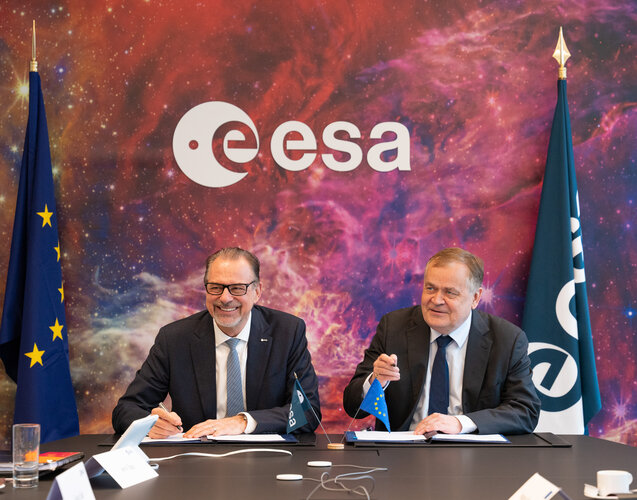The world faces challenges stemming from climate change, natural disasters and human actions. Space is crucial to help tackle these challenges, but many organisations have yet to realise its full potential. ESA has proposed three ‘accelerators’ – recent initiatives that contribute to sustainability and resilience on Earth and in space – and will work with the EU to realise their full potential.
As world leaders and nations race to accelerate climate action, ESA seeks to work with international, European and national partners to deliver tangible and measurable contributions to society’s decarbonisation journey. The Space for a Green Future accelerator will support the EU’s Green Deal to reduce greenhouse gases emissions, increase sustainable practices and make Europe the world’s first climate-neutral continent by 2050. It leverages the Copernicus Earth observation satellites and the Galileo navigation system – flagship components of the EU’s space programme that are implemented by ESA – to monitor and tackle climate change. ESA and the EU will work together on this accelerator to ensure consistency and maximise synergies between their activities.
The Rapid and Resilient Crisis Response accelerator aims to save lives and livelihoods by creating a space-powered system for crisis management. Complementing the Copernicus emergency management system and the Galileo emergency warning service, it will reinforce crisis management systems by providing a space-based alternative to terrestrial systems that can become compromised by natural disasters or other actions. This accelerator will notably contribute to some of the objectives of the EU’s space strategy for security and defence adopted by the European Commission.
Because space is crucial to daily life on Earth, ESA and the EU will enhance the European capacity to guarantee strategic autonomy in the protection of assets in space and on ground, through the Protect accelerator. ESA and the EU have agreed to work together to establish operational space weather services for Europe, and to initiate a European approach for space traffic management that includes zero debris principles.
Mr Pesonen said: “This partnership will propel us forward in leveraging space technology. The EU space programme, and our EU space flagships, already provide tangible solutions to urgent societal needs here on the ground. With this collaboration arrangement, we commit to reinforce our cooperation in the development, demonstration and integration of space-enabled technological solutions responding to major environmental and societal challenges. We will work together to leverage our complementary capabilities and resources, building on the respective strengths, expertise and competences of each institution.”
Dr Aschbacher said: “ESA is working closely with the European Commission to develop a joint ambition for space in Europe and in the interests of European citizens. ESA’s technical expertise perfectly complements the European Commission’s political mandate in developing flagship space programmes that address the needs of European citizens and businesses. ESA and the European Commission have agreed that in a spirit of reciprocity, transparency, information-sharing and cooperation, we will work together in close cooperation with stakeholders to develop the three accelerators. Strengthening ESA–EU relations is a professional mission of mine, and part of ESA’s Agenda 2025 that I released at the beginning of my mandate as Director General of ESA.”
Today’s agreement provides a significant boost to ESA’s existing accelerator initiatives and demonstrates the commitment of both organisations to finding new and effective ways to make use of spaceflight and space technology to solve some of the most pressing problems facing Europe today.



